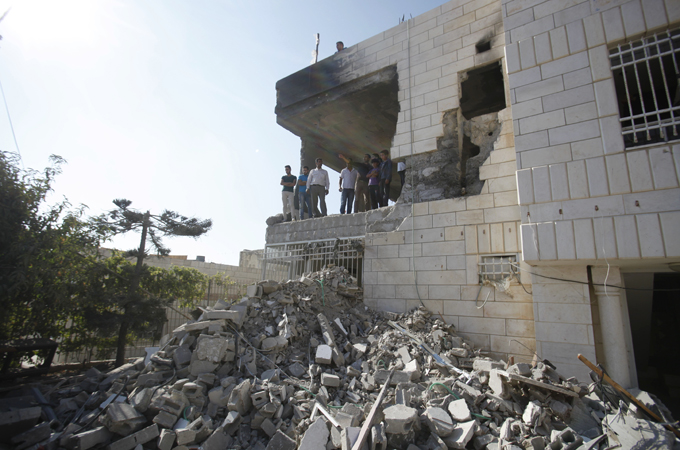Daily Archives: June 18, 2017
The United States moved to block U.S. military aid to Rwanda because of its support for the M23 Congolese rebel group believed to use child soldiers, the State Department said on Thursday.
The sanctions also apply to the Central African Republic, Myanmar, Sudan and Syria, according to the U.S. State Department. It was unclear whether those nations receive U.S. military assistance.
“Our goal is to work with countries who have been listed to ensure that any involvement in child soldiers – any involvement in the recruitment of child soldiers – stop,” U.S. Assistant Secretary of State for African Affairs Linda Thomas-Greenfield said.
State Department spokeswoman Marie Harf said Rwanda was sanctioned because of its “support for the M23, a rebel group which continues to actively recruit and abduct children” and to threaten the stability of the Democratic Republic of the Congo.
M23 is a Tutsi-dominated rebellion of former Congolese soldiers that began taking parts of eastern Congo last year, accusing the government of failing to honor a 2009 peace deal.
Rwanda will not receive U.S. International Military Education and Training funds, which help train foreign militaries, nor will it get U.S. Foreign Military Financing, which funds the sale of U.S. military materiel and services, Harf said.

Brigadier General Joseph Nzabamwita, spokesman for the Rwanda Defense Forces, said his country should not be held responsible for events outside its control.
“It is surprising that Rwanda would be liable for matters that are neither on its territory, nor in its practices,” he said. “As a long term partner of the Rwanda Defense Forces, the United States has ample evidence that our forces have never tolerated the use of children in combat.”
“Rwanda’s commitment to a sustainable solution that seeks to bring an end to the DRC conflict and its consequences, including the use of child soldiers, remains unchanged,” he added.
“The collaboration between the Government of Rwanda and the United States remains strong, particularly in the field of peacekeeping, and Rwanda will continue to hold its forces to the highest standards of professionalism and discipline,” he added.
Harf, the State Department spokeswoman, said she was not aware of Syria receiving any U.S. military assistance. She also said she did not believe Syria or Myanmar receive such aid and would check on whether or not Sudan did.
Three other countries whose militaries are known to recruit and use child soldiers, however, received waivers from the U.S. sanctions – Chad, South Sudan and Yemen, another State Department official said, speaking on condition of anonymity.
The Democratic Republic of Congo and Somalia received partial waivers, the official said, adding that the Obama administration has decided such exemptions “would be in the national interest of the United States.”
By law, the U.S. State Department must keep track of nations whose governments recruit and use children as soldiers as part of its annual report on human trafficking. The 10 countries affected by Thursday’s actions were all cited in the State Department’s latest findings, issued in June.
Those countries can be denied some types of U.S. funds for military assistance unless the White House grants a waiver. The 2008 law also allows U.S. officials to block licenses needed for those nations to buy military equipment.
It was not immediately clear how much U.S. funding would be blocked because of Thursday’s action.
Rwanda was not granted a waiver because of its role backing the M23 rebels in nearby Democratic Republic of Congo, Thomas-Greenfield, the top U.S. diplomat for Africa, said in an online forum with reporters broadcast on the State Department website.
U.N. investigators and the Congolese government have accused Rwanda of sponsoring the rebellion, a charge Rwanda denies.
“Any support of those rebel groups is seen as contributing to conflict in the region,” Thomas-Greenfield told reporters, adding that U.S. officials will continue to discuss the issue with the Rwandan government.
The United States will still support peacekeeping efforts in Rwanda, the other official added. Reutesr
Palestinians: Israel’s Goodwill Gestures Send Wrong Messages by Bassam Tawil June 2, 2017 at 5:00 am https://www.gatestoneinstitute.org/10464/israel-goodwill-gestures Send Share 40 Comment Here is what is being said on the Palestinian street:
- Here is what is being said on the Palestinian street: Today Israel runs away from the West Bank or the Gaza Strip; tomorrow Israel will run away from Ashkelon, then from Tel Aviv and from there to the sea, and we have achieved our goal of destroying Israel. Therefore, we need to continue attacking Israel.
-
- As with the Gaza Strip, the withdrawal from Lebanon taught the Palestinians that terrorism could drive Israelis out of their country.
- Never have the Palestinians given Israel credit for its goodwill steps. On the contrary, they scoff at these moves and describe them as “cosmetic changes”. The Palestinian line is that Israel’s steps are “insufficient” and “unhelpful.” Its concessions are regarded as gestures of a terrified people and as the rightful reward for terrorism. Far from satiating the appetite of the terrorists, such steps prompt them to step up their attacks against Israelis.
The West suffers under a major misconception concerning the Israeli-Palestinian conflict: that “goodwill gestures” and territorial concessions on the part of Israel boost the prospects of peace in the Middle East. The facts, however, suggest that precisely the opposite is true.
Last week, Israel’s Channel 10 television station reported that the U.S. administration was pushing Israel to transfer parts of Area C — areas under full Israeli security and civilian control in the West Bank — to the control of Mahmoud Abbas’s Palestinian Authority (PA). According to the report, the U.S. believes that the transfer of the territory to the PA would be a “goodwill step” towards the Palestinians, paving the way for the revival of the stalled peace process with Israel.
This assumption, of course, has already proven wrong. The experiences of the past few decades have shown clearly that Israeli concessions have always sent the wrong message to the Palestinians.
In fact, Palestinians read Israeli goodwill steps as signs of weakness and retreat. This misinterpretation on the part of the Palestinians then leads to more violence against Israel. It would be hard for anyone not to conclude that if pressure works, keep on pressuring.
The past 24 years are littered with examples of how the Palestinians react to Israeli concessions.
The Oslo Accords that were signed between Israel and the PLO in 1993 were seen by Palestinians as a first step by Israel towards total capitulation.
The accords, which brought the PLO from several Arab countries to the West Bank and Gaza Strip, came after five years of the first Palestinian Intifada. By allowing the PLO to assume control over large parts of the West Bank and Gaza Strip, Israel sent a message that it was caving in to the violence and terrorism of the First Intifada.
Barely a breath after Oslo, Israel was again asked to conciliate the Palestinians: this time, hundreds of prisoners, many with Jewish (and Arab) blood on their hands, were released from Israeli prison in order to create an atmosphere “conducive” to the peace process.
Instead of viewing the prisoner release for what it was, namely a generous gesture, many Palestinians considered it a “victory” for terrorism and violence. Worse, it was not long before many of the released prisoners were rearrested for their role in further terrorism against Israel. The release of prisoners also sent a message of recidivism to Palestinians: terror does indeed pay! A short stint in an Israeli prison is sure to lead to release in some Israeli “confidence-building measure” or other.
According to statistics, at least half of released Palestinian prisoners have returned to terrorism.
Despite the grim statistics, the international community regularly demands that Israel release more convicted terrorists as a “gesture” towards Mahmoud Abbas and other Palestinians.

Palestinian terrorists who were released from prison by Israel as a “goodwill gesture” are honored at Mahmoud Abbas’ presidential compound in Ramallah, on October 30, 2013. According to statistics, at least half of released Palestinian prisoners have returned to terrorism. (Photo by Oren Ziv/Getty Images) |
Since 1993, Israel has complied again and again with such international pressure, only to reinforce the message to Palestinians: terrorism is indeed worth the trouble.
Let us consider, for a moment, Gaza. In 2005, Israel unilaterally withdrew from the Gaza Strip, after destroying 21 Jewish settlements and expelling more than 8,000 Jews from their homes there.
In Palestinian eyes, however, the Israeli “disengagement” from the Gaza Strip was anything but an olive branch of peace. The withdrawal came after five years of the bloody Second Intifada, when Palestinians waged a massive campaign of suicide bombings and rocket attacks against Israelis.
Thus, for Palestinians, Israel was once again retreating in the face of unremitting bloodshed.
Here is what is being said on the Palestinian street: Today Israel runs away from the West Bank or the Gaza Strip, tomorrow Israel will run away from Ashkelon, then from Ashdod and Tel Aviv and from there to the sea, and we have achieved our goal of destroying Israel. Therefore, we need to continue attacking Israel.
Moreover, it was also precisely the Israeli pullout from Gaza that launched Hamas to its current pinnacle of popularity among Palestinians. Hamas took credit for expelling the Jews from the Gaza Strip through terrorism. A few months later, Hamas even won the Palestinian parliamentary election because Palestinians gave Hamas total credit for driving Israel out of the Gaza Strip.
The Israeli pullout told Palestinians in no uncertain terms: Why bother negotiating when terror will do the trick?
Five years earlier, the Israeli withdrawal from southern Lebanon also had the same effect: it emboldened the Iranian-backed Hezbollah terror group. As with the Gaza Strip, the withdrawal from Lebanon taught the Palestinians that terrorism could drive Israelis out of their country.
In the past few years, additional Israeli goodwill gestures, such as removing security checkpoints and the easing travel restrictions in the West Bank, led to yet more violence, claiming the lives of yet more Israelis.
Abbas and his top officials have always responded to Israeli gestures with cynicism. Never have they given Israel credit for its goodwill steps. On the contrary, they scoff at these moves, and describe them as “cosmetic changes aimed at beautifying Israel’s ugly face” or as public-relations stunts.
For the sake of clarity, let us say it clearly: handing over areas in the West Bank to the Palestinian Authority, and the release of convicted murderers, does not contribute to any sort of “peace process;” it only contributes to the death of more Israelis.
The Palestinian line is that Israel’s steps are “insufficient” and “unhelpful.” Its concessions are regarded as gestures of a terrified people and as the rightful reward for terrorism. Far from satiating the appetite of the terrorists, such steps prompt them to step up their attacks against Israelis. The next time Americans and Europeans think of asking Israel to cede yet more to the Palestinians, let them consider what Israel might be receiving in return, other than the spilling of more Jewish blood.
Bassam Tawil is a Muslim based in the Middle East.
Israeli demolitions ‘collective punishment’.

|
Israeli demolitions ‘collective punishment’ |
||
|
Families decry Israel’s demolition of the homes of Palestinians accused of killing three Israeli settlers in June. |
||
|
Israeli forces demolished 664 Palestinian homes as punishment between 2001 and January 2005 [Reuters] |
||
|
Hebron, occupied West Bank – Sobbing, Ghada Qawasmeh stares at her destroyed home, a two-story stone villa the family built over the course of nine years. The mother of seven is inconsolable, thinking of her husband, Hussam, who is now in an Israeli prison. “This is collective punishment,” she says. “What did I or my children do?” Before dawn on Monday, Israeli troops destroyed the Qawasmeh family’s house in Hebron in the occupied West Bank. Israeli officials said the demolition was carried out as punishment for Hussam Qawasmeh’s alleged involvement in the kidnapping and killing of three Israeli settler teens in June, and came after Israel’s supreme court affirmed the army’s position. Last month, Israel accused three men of being behind the disappearance and subsequent death of the Israeli youths, who were hitchhiking from a Jewish settlement near Hebron: Hussam and Marwan Qawasmeh, and Amer Abu Eisha.
Abu Eisha’s family home was also demolished on Monday, while Marwan Qawasmeh’s was sealed off with cement. “We are determined in bringing the ruthless murderers of Gilad, Eyal and Naftali to justice. The demolition of the terrorists’ homes conveys a clear message to terrorists and their accomplices that there is a personal price to pay when engaging in terror and carrying out attacks against Israelis,” said Peter Lerner, an Israeli army spokesperson, in a press statement. While Marwan and Abu Eisha are in hiding, the Shin Bet, Israel’s internal security agency, said Hussam admitted to receiving funds for the operation from Hamas operatives in Gaza. But Hamas officials have denied any involvement, and so far, no evidence against the three men has been divulged.
Ghada also maintains that her husband is innocent, that the real killers are still at large, and that destroying her home is merely an act of revenge. “By demolishing the house they’ll destroy my life and my children’s. There’s a million ways [to deter attacks] without destroying people’s lives,” said Ghada, who has now moved in with her in-laws. RELATED: ‘He had a bright future, and now he’s gone’ Meanwhile, Amer Abu Eisha’s mother, Nadia, is more composed: this is the second time that her home has been demolished since 1995. Back then, a man wanted by the Israelis sought shelter in the building. “We’ve spent more than 15 years building this house for us and our children,” Nadia said. “God knows what we’ve been through to do that. This is my life, my shelter. But they will demolish, and we will rebuild.” Parts of the Abu Eisha and Qawasmeh’s homes were demolished last month. Israeli rights group HaMoked urgently petitioned the Israeli supreme court in July against the demolition of the three men’s homes. On August 11, the court rejected the appeal, arguing that “the demolition of the houses was imperative to deter other terrorists from committing additional severe terrorist attacks”. In this case, the court decided to support army claims “that the deterioration in the security situation justifies a return to the policy it had already invalidated”. “The supreme court’s position has always been [that it’s] not competent enough in military affairs,” said Jeff Halper, the founder of the Israeli Committee Against House Demolitions. “Almost always, when the army says it has to do something, the court says it can.” For decades, the Israeli authorities have been demolishing the homes of Palestinians it accuses of carrying out attacks. But in 2005, they announced a halt to this practice, which human rights groups regularly condemned as an act of collective punishment. Between 2001 and January 2005, Israeli forces demolished 664 homes as punishment, leaving more than 4,000 Palestinians homeless, according to Israeli human rights group B’Tselem. In these cases, no evidence was required to prove that the alleged attacker’s family had any prior knowledge of his or her plans. The demolitions are often carried out by armoured bulldozers within hours of the attack, and in the late night hours, without enough prior notice to allow families to salvage some of their belongings. In Ghada’s case, the Israeli State Attorney accepted HaMoked’s request to give her family 12 hours’ notice before her house was flattened. IN PICTURES: West Bank shops boycott Israel
According to Halper, house demolitions do not serve the army’s intended purpose. “They know it doesn’t deter,” he said. “What it does is it helps the Israeli people feel that they’ve been avenged. It’s basically collective punishment.” Moshe Ya’alon, a former army chief of staff, was one of the first in Israel’s top echelon to question the practice. He formed a review committee in 2004, which found that home demolitions were harmful to Israel because they bred hatred among Palestinians.
Prior to that, Israeli authorities had maintained that in many cases, fear of home demolitions led families to turn in their relatives to Israeli or Palestinian authorities to stop them from carrying out attacks. Punitive demolitions have so far only applied to Palestinians: the homes of three Israelis who are accused of murdering Mohammad Abu Khdair, a Palestinian teenager from the East Jerusalem neighbourhood of Shu’fat, remain intact. In July, two minors and an older man beat Abu Khdair and burned him alive, in apparent revenge for the death of the young Israelis. During the search for the three missing Israelis, the Israeli army arrested approximately 1,000 Palestinians in a series of nightly raids. “They won’t demolish the Israelis’ houses,” Halper said. “They will say it’s not a pattern. It’s a one-off thing, it’s a bad apple, it’s a crazy guy. And therefore since it’s an isolated event, it doesn’t warrant demolishing a house because there’s nothing preventative here.” In the meantime, both Nadia and Ghada are still coming to terms with the levelling of their homes. “I lost a son, I’m missing another,” said Nadia, who has six children, one of whom is dead, another at large, and a third in prison, along with his father. “The bricks are meaningless. I want my son and husband back. They are the ones that mean the world to me.” |
Israel Can Establish Diplomatic Relations with Arab World by Learning from Putin
The geopolitical landscape surrounding Israel is shifting in such a way that if navigated correctly could lead to full diplomatic relations between Jerusalem and Sunni Arab governments around the Middle East.
Of growing significance is the common ground that is being created between Jerusalem and the Gulf Arab states as a result of the proxy war that is being waged by Iran against Saudi Arabia.
In response to Tehran’s growing influence across the Middle East Israel has been making a concerted, if quiet, effort over the last few months to improve its relations with the Gulf monarchies. Iran’s nuclear deal with the United States and other foreign powers has only spurred Israeli efforts to develop back-channel relations with Arab states.
However, typical of Israeli Prime Minister Benjamin Netanyahu’s risk-averse administration, the issue of normalizing relations with the Arab world is being handled with extreme caution and tortured temporizing.
Unfortunately for Premier Netanyahu and his acolytes, the delicate art of equivocation and half measures is lost upon a region currently in the throes of civil wars, political upheavals and Iranian imperialism.
For Israel to best capitalize on the historic changes taking place in the region, the Israeli government should avoid the muddled and restrained approach taken by US President Barack Obama and take a page from the clear and concerted policies of Russian President Vladimir Putin.
It’s easy to dismiss Putin as an anti-Western autocrat, whose efforts to expand Russia’s sphere of influence have been blunt and reckless. Still, if the barometer for diplomatic success is defined as a country’s ability to project and protect its role in regional politics, Russia under the leadership of Vladimir Putin has been nothing if not effective.

Russian President Vladimir Putin (Alexander Zemlianichenko/AP)
Simultaneously, Barack Obama’s shifting of US support from regional Sunni powers Egypt and Saudi Arabia to Shiite Iran is a diplomatic sea change of a different sort.
In stark contrast to Putin’s realpolitik perspective that seeks to maximize Russian power, Obama’s embrace of Iran is guided by a ferocious desire to shrink America’s global diplomatic footprint. Swapping American exceptionalism for multiculturalism, Obama takes a jaundiced view of American power, which should be tempered by supranational organizations and international agreements.
With regards to Israel, the government in Jerusalem needs to embark on a paradigm shift vis-a-vis its dealings with Sunni Arab powers. The Netanyahu administration, similar to its predecessors, is enamored with the concept of stability, even at the expense of a potentially historic breakthrough in relations with the Arab world.
On balance, the military realignments in the region are likely benefit Israel, but only if its leaders act boldly. First, intelligence and commercial cooperation with Sunni Arab states should be based on the establishment of full diplomatic relations between Jerusalem and respective Arab nations. Second, the foreign embassies of these nations must be located in Jerusalem, not Tel Aviv.
Granted, there is nothing tactful or elegant about this diplomatic approach. But Israeli diplomacy in a time of regional chaos should strive beyond the tired, ineffective and largely meaningless desire to just be ‘recognized’.
After all, that most basic of desires, to survive, will surely compel Sunni governments to comply with Israel’s conditions if it means gaining access to Israeli intelligence, military hardware and cybersecurity technology.
The power wielded by today’s Sunni Arab leaders may someday depend upon making peace with the existence of a Jewish State in the heart of the Middle East.
Impamvu yogukuraho umwakagara irabonetse!

Nyuma yuko perezida wa repubulika Paul Kagame yiyemereye we,ubwe ko,agiye kwica abaturage ashinzwe kurindira umutekano,ibi akaba yarabivuze kuwa 05th Kamena 2014,mu ijambo yavugiye Inyabihu mu ntara yamajyepfo.
Aha abanyarwanda bakaba batari bakwiriye gutegereza yuko kagame asohoza imigambi ye,nkuko yabyivugiye,ahubwo bakaba bakwiye kumutanga bakamukura ku ntebe dore ko namahanga atazabigaya kuko yamaze kwiyemerera we,ubwe ko azabica ibyo yongeye kubyemerera umunyamakuru wa Jeune Afrique ubwo bagiranaga ikiganiro kirambuye.
Maze Paul Kagame yivugira ko bitakiri ibanga aho yagaragaje ko mu gihugu ayoboye kitagendera kumategeko ndetse kitubahiriza uburenganzira bwa kiremwa muntu,abanyarwanda bakaba basaba ingabo z’Urwanda gukora ibishoboka byose ngo barebe ko umwakagara bamwikiza hakiri kare.
Ubundi abantu batinya gukora igikorwa nk’icyo kubera ko cyiba kitajyanye namategeko,ariko iyo bibaye murwego rwogutabara abaturage ntamategeko abihana!ibyari kuzaba urubanza nyirubwite yamaze kurwicira kuburyo n’amahanga nayo kugez’ubu afite iyo nyandiko mvugo yivugiye we ubwe.
Ariko niba umukuru w’ingabo Gen.Nyamvumba Patrick azareberera ubwicanyi bukomeje gukorwa nashebuja,kandi afite uburyo ndetse n’ubushobozi bwogukiza abanyarwanda hakiri kare nta shiti ko azabibazwa.Nyamara yarabonye akanya keza ako kagame yita THE RIGHT TIME,bityo yakagombye guhita atabara abanyarwanda akabakiza ishyano hakiri kare kandi twese abanyarwanda twamushyigikira ndetse yaba akoze igikorwa cya kigabo.

Ariko tekereza niba abanyarwanda bakomeje gushirira ku icumu bamarwa nuwakagombye kubarinda aaba yarabitangaje kumugaragaro ntagushidikanya yuko ingabo z’Urwanda zizahura n’ubutabera nyuma y’ubwicanyi zashyigikiye ndetse ntizigaragaze ubushake bwogutabara abanyarwanda kandi bari babifitiye ubushobozi.
Burya Imana ikorana nabanyabwenge mu gihe Imana yamukoresheje nkuko yabivuze ko mbere yuko imukuraho izabanza kumwambura ubwenge kugirango imukoze isoni mu marembo y’amahanga,aha rero niho ubwenge buri icyo bita “OPOTURNITIST “ gukorera mumahirwe mu gihe gikwiriye Chance Comes Once.
Akaba rero arintgikozwe abanyarwanda mwemere umwakagara abace amajosi kuko mwamugize ikigirwamana munanirwa kwirwanaho mugihe akimuhana kaza imvura ihise,mukazasigara muvuga amateka gusa nyamara mwakagombye gukora amateka meza aho kugirango muzavuge amateka mabi.


























